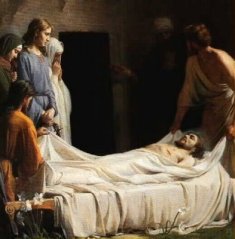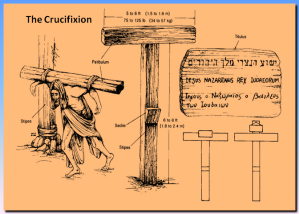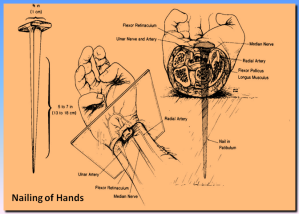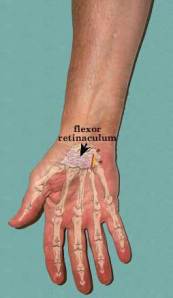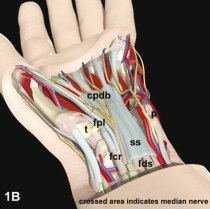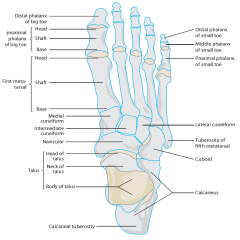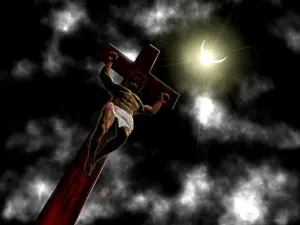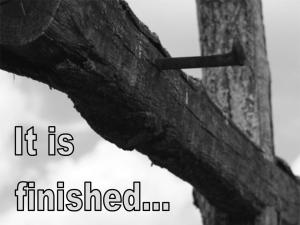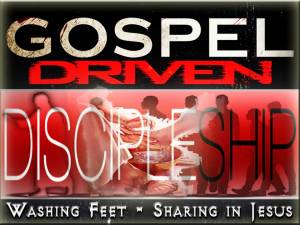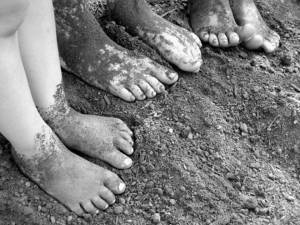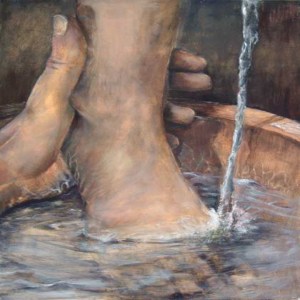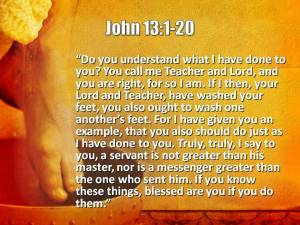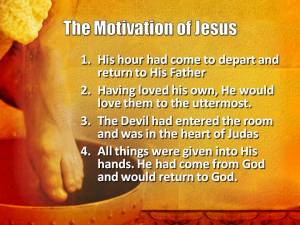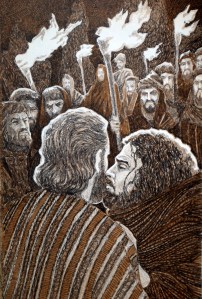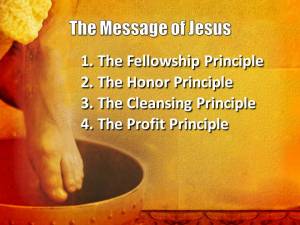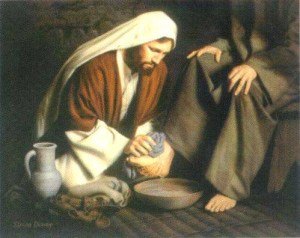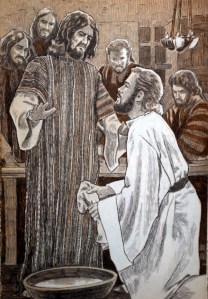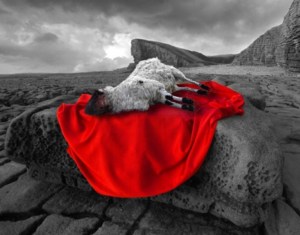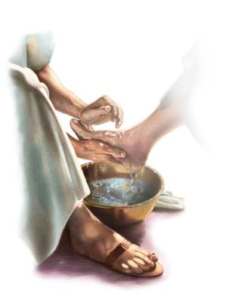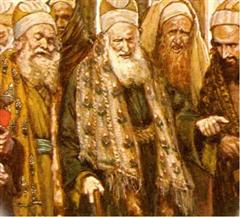 A young boy once accompanied his mother to worship. During the sermon, the boy was listening very attentively to the lesson that day. The preacher’s sermon on the crucifixion of Christ was so moving that the boy began to weep. Soon he began to cry aloud. His mother became so embarrassed that she whispered to him, “Don’t take it so seriously.”
A young boy once accompanied his mother to worship. During the sermon, the boy was listening very attentively to the lesson that day. The preacher’s sermon on the crucifixion of Christ was so moving that the boy began to weep. Soon he began to cry aloud. His mother became so embarrassed that she whispered to him, “Don’t take it so seriously.”
Oh, that we would take the cross more seriously.
- If we take the Cross from the Bible, we have no Bible.
- If we take the Cross from God, we have no God.
- If we take the Cross from Jesus, we have no Savior.
- If we take the Cross from our lives, we have no Salvation.
 This morning we want to lay the Foundation of the Cross: “Because of the Cross…we have Jesus.”
This morning we want to lay the Foundation of the Cross: “Because of the Cross…we have Jesus.”
When Jesus was on the Cross, suspended between God and man, the Bible records something the jeering crowds said to Jesus:
Mark 15:29-30 And those who passed by derided him, wagging their heads and saying, “Aha! You who would destroy the temple and rebuild it in three days, save yourself, and come down from the cross!”
Not only did they tell Jesus to save himself, they also said:
Matthew 27:42 “He saved others; he cannot save himself. He is the King of Israel; let him come down now from the cross, and we will believe in him.
The crowd was calling for Jesus to come down from the Cross. They said “save yourself” and we will believe in you.
 This is the choice that has confronted mankind since Adam and Eve. Do we trust in God for our salvation? Or do we trust in our own efforts and seek to save ourselves? Jumping off the Cross was not the miracle that Jesus was going to use to save mankind or himself. The Cross had a work to do in His life, and it has a work to do in our life. As we discover all that is available to us “Because of the Cross…” we will come to cherish its work in our lives, just as Jesus realized what it was working in His life.
This is the choice that has confronted mankind since Adam and Eve. Do we trust in God for our salvation? Or do we trust in our own efforts and seek to save ourselves? Jumping off the Cross was not the miracle that Jesus was going to use to save mankind or himself. The Cross had a work to do in His life, and it has a work to do in our life. As we discover all that is available to us “Because of the Cross…” we will come to cherish its work in our lives, just as Jesus realized what it was working in His life.
The Cross was not incidental to Jesus Christ. It was no “book-end” to His great teachings. He was not a “martyr” for his cause. The Cross defined everything about Jesus Christ. Because of the Cross…we have Jesus.
We will look at three major aspects of Jesus’ life here on Earth, and we will see how each one is defined by the Cross. We Will Look At His Mission, His Message And His Ministry.
A. The Mission of Jesus is defined by the Cross.
It was a 99-degree September day in San Antonio, when a 10-month-old baby girl was accidentally locked inside a parked car by her aunt. Frantically the mother and aunt ran around the auto in near hysteria, while a neighbor attempted to unlock the car with a clothes hanger. Soon the infant was turning purple and had foam on her mouth. It had become a life-or-death situation when Fred Arriola, a wrecker driver, arrived on the scene. He grabbed a hammer and smashed the back window of the car to set her free.
Was he heralded a hero? Arriola reported, “The lady was mad at me because I broke the window.” “I just thought, What’s more important–the baby or the window?”
 This world scoffs at the Cross as if it was no big deal. They are like the mom who is more concerned about her car than the baby. They see the Cross as some aberrant part of Jesus life, but ignore the impact the Cross has upon the way we live. They would rather have their life intact than subject it to the work of the Cross that they might be saved.
This world scoffs at the Cross as if it was no big deal. They are like the mom who is more concerned about her car than the baby. They see the Cross as some aberrant part of Jesus life, but ignore the impact the Cross has upon the way we live. They would rather have their life intact than subject it to the work of the Cross that they might be saved.
To Jesus, the Cross defined His very purpose for coming to the Earth. The Cross defined His very mission.
Philippians 2:7-8 but made himself nothing, taking the form of a servant, being born in the likeness of men. And being found in human form, he humbled himself by becoming obedient to the point of death, even death on a cross.
Indeed, when the time appointed approached, Jesus set His face like a flint:
Luke 9:51 When the days drew near for him to be taken up, he set his face to go to Jerusalem.
This is a reference to a prophecy in Isaiah:
Isaiah 50:7 But the Lord GOD helps me; therefore I have not been disgraced; therefore I have set my face like a flint, and I know that I shall not be put to shame.
As hard as the hearts of men are toward God, so was Jesus determined with every strand of His DNA to go to the Cross!
Ezekiel 3:8-9 Behold, I have made your face as hard as their faces, and your forehead as hard as their foreheads. Like emery harder than flint have I made your forehead. Fear them not, nor be dismayed at their looks, for they are a rebellious house.”
B. The Message of Jesus is defined by the Cross
We often associate the Message of Jesus with John 3:3 or John 3:16
John 3:3 Jesus answered him, “Truly, truly, I say to you, unless one is born again he cannot see the kingdom of God.”
John 3:16 “For God so loved the world, that he gave his only Son, that whoever believes in him should not perish but have eternal life.
 Actually, the Message of Jesus was demonstrated in actions rather than words:
Actually, the Message of Jesus was demonstrated in actions rather than words:
1 Peter 2:21 For to this you have been called, because Christ also suffered for you, leaving you an example, so that you might follow in his steps.
We can see this is true because of this common theme in His preaching:
- Matthew 10:38 And whoever does not take his cross and follow me is not worthy of me.
- Mark 8:34 And calling the crowd to him with his disciples, he said to them, “If anyone would come after me, let him deny himself and take up his cross and follow me.
- Mark 10:21 Then Jesus beholding him loved him, and said unto him, One thing thou lackest: go thy way, sell whatsoever thou hast, and give to the poor, and thou shalt have treasure in heaven: and come, take up the cross, and follow me.
- Luke 9:23 And he said to all, “If anyone would come after me, let him deny himself and take up his cross daily and follow me.
- Luke 14:27 Whoever does not bear his own cross and come after me cannot be my disciple.
As we look at the Gospels of Matthew, Mark and Luke and ask, “What is the message of Jesus Christ?” The Cross is the defining message of Jesus.
 Not only did the Cross secure our forgiveness from sin, but the Cross is the basis of our fellowship with God and each other. Not only did the Cross enable our New Birth, but the Cross enables us to follow and serve Jesus. The Cross is the basis of our living as a Disciple of Jesus Christ.
Not only did the Cross secure our forgiveness from sin, but the Cross is the basis of our fellowship with God and each other. Not only did the Cross enable our New Birth, but the Cross enables us to follow and serve Jesus. The Cross is the basis of our living as a Disciple of Jesus Christ.
The Cross is in the Sermon on the Mount.
Matthew 5:3-11 “Blessed are the poor in spirit, for theirs is the kingdom of heaven. “Blessed are those who mourn, for they shall be comforted. “Blessed are the meek, for they shall inherit the earth. “Blessed are those who hunger and thirst for righteousness, for they shall be satisfied. “Blessed are the merciful, for they shall receive mercy. “Blessed are the pure in heart, for they shall see God. “Blessed are the peacemakers, for they shall be called sons of God. “ Blessed are those who are persecuted for righteousness’ sake, for theirs is the kingdom of heaven. “Blessed are you when others revile you and persecute you and utter all kinds of evil against you falsely on my account.
- Take away the Cross and there is no poor in spirit, only pride
- Take away the Cross and there is no mourning over sin.
- Take away the Cross and there is no meekness.
- Take away the Cross and there is no Righteousness of God available.
- Take away the Cross and there is no mercy.
- Take away the Cross and there is no way to be pure in heart.
- Take away the Cross and there is no possibility of peace.
- Take away the Cross and there is no persecution for Righteousness sake.
Look at any message or command of Jesus Christ and it becomes meaningless without the Cross.
C. The Ministry of Jesus is Defined by the Cross
“Let a man preach with the greatest ability and zeal everything in the Bible but the Cross, he shall, as to the great end of preaching, preach in vain. While, on the other hand, the honest preaching of the Cross – though in great weakness, and even when accompanied with great deficiencies as to a full declaration of the counsel of God on some other subject – has usually been accompanied with the divine blessing. The leading object of the preacher should be to keep the mind and the heart of his hearers steadily fixed on Christ Jesus – Christ Jesus crucified[1].”
 Most ministries today seek the glory of man. The emphasis is on production, media, and ratings. Ministry has become “professional.” Ministries today say, “Look how great our _____________ is.” It can be numbers, the facilities, the preacher, the TV ministry, radio. Ministry in America is corrupted by a man-centered view of effectiveness.
Most ministries today seek the glory of man. The emphasis is on production, media, and ratings. Ministry has become “professional.” Ministries today say, “Look how great our _____________ is.” It can be numbers, the facilities, the preacher, the TV ministry, radio. Ministry in America is corrupted by a man-centered view of effectiveness.
In the meantime, our Nation is not impacted for righteousness. We are not producing “fruits meet for repentance.” Pride in ourselves and our accomplishments will always interfere with enjoying the Righteousness of God!
Luke 3:8 Bear fruits in keeping with repentance. And do not begin to say to yourselves, ‘We have Abraham as our father.’ For I tell you, God is able from these stones to raise up children for Abraham.
You visit third world countries where the Gospel is spreading and people are coming to Jesus, they do not put money into facilities, they do not brag about numbers, they give glory to God for what He is doing, and then they add there is still so much to do. They do not have much money, they do not have anything to boast in, but they have Jesus!
Jesus revealed His ministry strategy in John 12:
John 12:23-26 And Jesus answered them, “The hour has come for the Son of Man to be glorified. Truly, truly, I say to you, unless a grain of wheat falls into the earth and dies, it remains alone; but if it dies, it bears much fruit. Whoever loves his life loses it, and whoever hates his life in this world will keep it for eternal life. If anyone serves me, he must follow me; and where I am, there will my servant be also. If anyone serves me, the Father will honor him.
- Jesus said His glory was revealed in His death.
- Jesus said if anyone serves Him, they must follow Him.
Where is Jesus? Is He in our beautiful buildings? Is He sitting comfortably on a padded chair or padded pew?
 Hebrews 13:8 reveals where Jesus is and where those who serve Him are to go:
Hebrews 13:8 reveals where Jesus is and where those who serve Him are to go:
Hebrews 13:8-13 Jesus Christ is the same yesterday and today and forever. Do not be led away by diverse and strange teachings, for it is good for the heart to be strengthened by grace, not by foods, which have not benefited those devoted to them. We have an altar from which those who serve the tent have no right to eat. For the bodies of those animals whose blood is brought into the holy places by the high priest as a sacrifice for sin are burned outside the camp. So Jesus also suffered outside the gate in order to sanctify the people through his own blood. Therefore let us go to him outside the camp and bear the reproach he endured.
Servants are not to be led away by teaching which is contrary to Jesus’ Life! He is the same yesterday, and today and forever. His ministry objective never changes!
Jesus is all about the Cross.
Jesus suffered and died outside the camp, away from the padded pews and the central air. He died outside to camp to bring righteousness to sinful people through His sacrifice. If we are to see righteousness and revival, we must go to Him outside the camp and bear His reproach. If we are to follow Jesus, we must bear the reproach of the ministry of the Cross.
D. What then is the Mission, Message and Ministry of the Cross?
- (How can we experience the power of the Cross that Paul spoke about?)
The Cross is the Wisdom of God as opposed to the Wisdom of Man
1. The Cross Reveals the Wisdom & Power of God
1 Corinthians 1:17-21 For Christ did not send me to baptize but to preach the gospel, and not with words of eloquent wisdom, lest the cross of Christ be emptied of its power… For since, in the wisdom of God, the world did not know God through wisdom, it pleased God through the folly of what we preach to save those who believe.
a. God’ wisdom is revealed in the Cross.
 Are you facing a difficult decision? Do you really need God’s Wisdom for a particular situation? Do not ask God for wisdom if you are not willing to apply the Cross to your life. He will not give it, for His Wisdom ALWAYS involves the Cross.
Are you facing a difficult decision? Do you really need God’s Wisdom for a particular situation? Do not ask God for wisdom if you are not willing to apply the Cross to your life. He will not give it, for His Wisdom ALWAYS involves the Cross.
Unfortunately, just as the Cross is foolishness to those who are not saved, so it can be foolishness to Christians who in their pride refuse to submit their lives to the Cross.
That is why Paul adds the qualifier to verse 18:
1 Corinthians 1:18 For the word of the cross is folly to those who are perishing, but to us who are being saved it is the power of God.
Regeneration is a onetime occurrence, but Life, or Salvation (sozo) is an ongoing, continual process. Many Christians are overcome by the world, (lost in the wilderness) because they fail to submit to the Cross of Christ.
Galatians 6:14 But far be it from me to boast except in the cross of our Lord Jesus Christ, by which the world has been crucified to me, and I to the world.
If you are to be continually saved from this wicked world, you must continually submit to the power of the Cross.
b. God’s Power is Revealed in the Cross
Just look at what happens in the lives of people when this message is preached and taught.
- …Murderers become martyrs…
- …fighters become lovers…
- …hate-mongers become peacemakers…
- …drunks become evangelists…
- …gang members become church members…
- …addicts become soul-winners…
and the list could go on and on and on! The very power of God is released in those of us who are being saved by the message of the Cross!Our lives, our wisdom, our objectives, our quarrels, our work, our play our families are all to be defined by the message of the Cross! When life is out of sorts, when turmoil and trials are surrounding you…Look to the Cross! There is peace at the Cross.
Colossians 1:20 and through him to reconcile to himself all things, whether on earth or in heaven, making peace by the blood of his cross.
2. The Cross Reveals the Folly of Man
 Just as the crowd taunted Jesus to come down from the Cross, it is not natural for us, even Christians, to submit our lives and possessions and goals and aspirations to the Cross.
Just as the crowd taunted Jesus to come down from the Cross, it is not natural for us, even Christians, to submit our lives and possessions and goals and aspirations to the Cross.
- Look at this exchange Jesus had with His lead Disciple:
Matthew 16:23-24 But he turned and said to Peter, “Get behind me, Satan! You are a hindrance to me. For you are not setting your mind on the things of God, but on the things of man.” Then Jesus told his disciples, “If anyone would come after me, let him deny himself and take up his cross and follow me.
If you are to set your mind on the things of God, you must submit to the Cross. It is because of the Cross that we can be acceptable to God.
- Look at this exchange Jesus had with a prospective disciple:
Mark 10:21 And Jesus, looking at him, loved him, and said to him, “You lack one thing: go, sell all that you have and give to the poor, and you will have treasure in heaven; and come, follow me.”
The Wisdom of Man is opposed to the Cross.
Philippians 3:17-19 Brothers, join in imitating me, and keep your eyes on those who walk according to the example you have in us. For many, of whom I have often told you and now tell you even with tears, walk as enemies of the cross of Christ. Their end is destruction, their god is their belly, and they glory in their shame, with minds set on earthly things.
3. Because of the Cross…we Have Jesus
1 Corinthians 1:17-18 For Christ did not send me to baptize but to preach the gospel, and not with words of eloquent wisdom, lest the cross of Christ be emptied (kenoo) of its power.
Kenóō The word kenóō, to make empty, is used metaphorically as meaning to bring to nothing in the sense of not accomplishing what one set out to accomplish as in Rom. 4:14, the faith not accomplishing its purpose. Used as an adj. in reference to the cross of Christ, meaning the cross not accomplishing its purpose, The antithesis of plēróō, to fill.[2]
The power of the Cross is what it provides for us – God’s Grace!
As we empty ourselves of our pride, we are filled to overfilling with God’s Grace!
James 4:6-10 But he gives more grace. Therefore it says, “God opposes the proud, but gives grace to the humble.” Submit yourselves therefore to God. Resist the devil, and he will flee from you. Draw near to God, and he will draw near to you. Cleanse your hands, you sinners, and purify your hearts, you double-minded. Be wretched and mourn and weep. Let your laughter be turned to mourning and your joy to gloom. Humble yourselves before the Lord, and he will exalt you.
 It is the Grace of God that is to Fill us and Lift us UP, not the pride and wisdom of man!
It is the Grace of God that is to Fill us and Lift us UP, not the pride and wisdom of man!
We are not to pick ourselves up by the bootstraps!
“Exalt” does not mean you will have glory and honor, as man defines it. We seek not our own, for we seek God’s Wisdom. We seek to die to self and humble ourselves and all that we want before God. When He is given freedom to work in your life, then He will bring His glory to you.
Just as Jesus could not enter the Glory of Heaven without being lifted upon the Cross, so too we cannot enjoy the Glory of God upon us unless we humble ourselves to the Cross, and allow Him to lift us up.
Here is a picture of this verse:
Mourners and penitents lay on the ground, and rolled themselves in the dust. When comforted and pardoned, they arose from the earth, shook themselves from the dust, and clothed themselves in their better garments. God promises to raise these from the dust, when sufficiently humbled[3].
J Vernon McGee paints a more graphic picture:
I observed a lifeguard once as he hit a drowning fellow with his fist and knocked him out. The lifeguard explained that the drowning man was struggling and that he could not help him until he gave up. I think sometimes God gives us the fist so that we just give up and let Him take over.[4]
So how do we experience the Mission, Message and Ministry of Jesus?
How do we experience Jesus?
We MUST EXPERIENCE the Cross!
Philippians 2:1-8 So if there is any encouragement in Christ, any comfort from love, any participation in the Spirit, any affection and sympathy, complete my joy by being of the same mind, having the same love, being in full accord and of one mind. Do nothing from rivalry or conceit, but in humility count others more significant than yourselves. Let each of you look not only to his own interests, but also to the interests of others. Have this mind among yourselves, which is yours in Christ Jesus, who, though he was in the form of God, did not count equality with God a thing to be grasped, but made himself nothing, taking the form of a servant, being born in the likeness of men. And being found in human form, he humbled himself by becoming obedient to the point of death, even death on a cross.
 Every step of Jesus on this planet took Him one step closer to the Cross.
Every step of Jesus on this planet took Him one step closer to the Cross.
His first step was what we call the “self-emptying”. Jesus, Son of God, Creator of this Universe, became nothing.
From the insignificant birth, to an insignificant childhood, to a ministry to an insignificant people. He sought no fanfare. He sought no audience with Kings. He sought no titles. He sought no riches. Jesus sought the Cross. (Jim Tompkins)
The life of Jesus began with His willing and loving release of privilege and power…those two things that mankind places great importance in. This was the wisdom of God.
The world, through its wisdom, cannot understand a wisdom based on sacrifice, love and grace.
- How foolish and weak it sounds to “turn the other cheek” in the face of an adversary’s threats.
- How foolish and weak it sounds to speak of “loving your enemies.”
- What kind of craziness is it to forgive others seventy times seven?
- What foolishness it is to speak of “loving your neighbor as yourself”?
- How silly it is to want to see yourself as a “servant” rather than as “the one being served.”
This is not the way of the world, but it is the way of the Cross!
Because of the Cross…We Have Jesus!
If you want to experience the grace and love of Jesus to the point that peace reigns in your heart, and His love pours through your life, you must choose whose wisdom you will follow.
Your choice is to live life in your pride and your own worldly wisdom, or to empty yourself, and submit everything to the Cross of Christ.
- Apathy toward the Cross is pride.
- Indifference to the Cross is pride.
- Ignorance of the Cross is pride.
- Neglect of the Cross is pride
Pride will prevent you from experiencing the Grace and Power of the Cross-Life!
Followers of Christ experience Jesus “Because of the Cross!”
- We have Peace because of the Cross.
- We have Unity because of the Cross.
 Wherever there is disunity, hatred, gossip, slander, you know there is pride, there is selfishness, and the power of the Cross is made useless.
Wherever there is disunity, hatred, gossip, slander, you know there is pride, there is selfishness, and the power of the Cross is made useless.
Only one thing can be done to lift up and restore the power of the Cross. Death to self and pride by repentance and humbling ourselves to will of Christ and His Cross.
2 Chronicles 7:14 if my people who are called by my name humble themselves, and pray and seek my face and turn from their wicked ways, then I will hear from heaven and will forgive their sin and heal their land.
Most of us have seen ‘Saving Private Ryan’. The captain, played by Tom Hanks, and most of his squad end up fatally wounded after trying to hold a bridge; but at least their mission has been accomplished: Private Ryan is safe. The dying words of Tom Hanks’ character have to be some of the cruelest last words on film. Hardly able to speak, the dying captain whispers to Private Ryan his final command: ‘Earn it! Earn it!’ In other words, live such a life that gives purpose to these men’s deaths. ‘Earn it!’ They are cruel words, for they placed upon Private Ryan a terrible, heavy burden. The film then closes with a scene in the present day as the now elderly Ryan kneels at the captain’s grave in a Normandy war cemetery. Tears stream down his cheek as he says to his wife, ‘Tell me I’ve been good. Tell me I’ve lived a good enough life.’
 “Can you imagine if Jesus’ dying words on that cross were, ‘You all earn it!’ Can you imagine how much greater the burden would be? To earn the death of the one we worship as God! The pressure would be overwhelming. We could never do it. Instead, Jesus cried, ‘It is finished.’ The message of the cross is simply that we can never earn it; nor do we need to. How do we respond to that? Well, in one sense, we can’t. It’s too much. In another sense, there is only one way – to love our God with all our heart, mind, strength and soul. In other words, to worship our God. Not to earn God’s love, but to revel in his love; not to persuade God to love us, but to delight in his love.” (Mark Meynell, “Cross -Examined” IVP, 2001, Leicester, pp.181&182)
“Can you imagine if Jesus’ dying words on that cross were, ‘You all earn it!’ Can you imagine how much greater the burden would be? To earn the death of the one we worship as God! The pressure would be overwhelming. We could never do it. Instead, Jesus cried, ‘It is finished.’ The message of the cross is simply that we can never earn it; nor do we need to. How do we respond to that? Well, in one sense, we can’t. It’s too much. In another sense, there is only one way – to love our God with all our heart, mind, strength and soul. In other words, to worship our God. Not to earn God’s love, but to revel in his love; not to persuade God to love us, but to delight in his love.” (Mark Meynell, “Cross -Examined” IVP, 2001, Leicester, pp.181&182)
[1] John Brown, D. D., An Exposition of The Epistle of Paul The Apostle to The Galatians, Banner of Truth, 2001, p. 370.
[2] Spiros Zodhiates, The Complete Word Study Dictionary – New Testament, (Chattanooga, TN: AMG Publishers, 1993), WORDsearch CROSS e-book, 857.
[3] Adam Clarke, A Commentary and Critical Notes, (New York: Abingdon-Cokesbury Press, 1826), WORDsearch CROSS e-book, Under: “James 4”.
[4] J. Vernon McGee, Thru The Bible with J. Vernon McGee, (Nashville, TN: Thomas Nelson, 1983), WORDsearch CROSS e-book, Under: “Chapter 4”.













